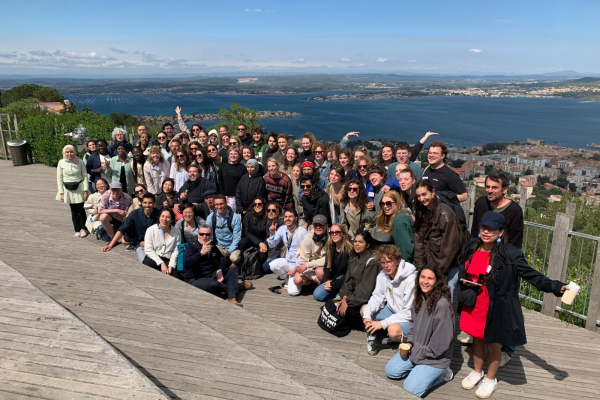Sixty CHARM-EU students from across Europe dove into the environmental issues faced by the Hérault region, France, from April 15th to 26th. Their mission: solve real-world challenges alongside local stakeholders.

This experience was part of the international master’s degree in “Global Challenges for Sustainable Development” offered by an alliance of five European universities. The programme emphasizes learning by doing, and MoXMo (Montpellier Cross-Thematic Mobility) is a key component. This Erasmus+ programme provides students with a short-term study abroad experience focused on tackling specific challenges.
No doubt, a change of scenery was guaranteed for the sixty or so young Europeans from universities in Spain, the Netherlands, Germany, Hungary and France who came to participate in this second edition of MoxMo, which took place from April 15 to 26 in the Hérault region of southern France. A key moment in their training, with a pedagogy focused on learning by solving challenges, this express student mobility programme gave them the opportunity to work in international and interdisciplinary teams on environmental themes in line with the challenges of our territory.
Multicultural Teams Address Local Needs
Five environmental challenges were developed for the students by the programme’s teaching staff and the Syndicat Mixte du Bassin de Thau (SMBT), a local water management authority. ‘We benefit from the students’ diverse backgrounds and perspectives, their fresh thinking often leads to solutions we might not have considered,’ explains Alexandre Pennaneac’h, who manages the Blue Thau Lab, SMBT’s platform for territorial collaborative innovation.
For the master’s students, the challenge was to think about how to raise awareness and involve citizens, civil society and the professional world in specific issues concerning the Thau lagoon. The challenges covered agri-photovoltaics applied to shellfish farming, the use of AI to analyse the water in the Thau lagoon, eco-responsible walking routes, subsidised environmentally friendly measures for agriculture and livestock farming, food safety, etc.
The last challenge involved exploring the potential of the University of Montpellier’s aquaponics training facility. Aquaponics combines aquaculture (raising fish) with hydroponics (growing plants without soil), creating a closed-loop system that minimizes waste and pollution. ‘Students have a much more global vision than we do, which is often very technical’, notes Claude Amiel, UM project manager at SMEL.
From podcast to interactive cartography
It was in Balaruc-les-Bains, on the shores of the Thau Lagoon, that the students spent their first week. There, they met with professionals working in strategic sectors of the region: fishing, viticulture, livestock, agriculture, oyster farming, tourism… Supervised by master’s degree teachers, the projects were developed under real-world conditions within teams made up of young people who were sometimes meeting for the first time and who, another major challenge, did not always speak French. L’association CPIE (Centre permanent d’initiatives pour l’environnement) bassin de Thau et les membres du SMBT ont également contribué à enrichir de leur expertise une réflexion holistique prenant en compte le rôle central de la protection de l’environnement et l’importance de la communication entre les différents acteurs du territoire.
During the second week, the young Europeans met with researchers from Icireward, the Unesco center on water, and visited different research sites while continuing to work on their challenges. ‘It’s a field school: students find themselves having to deal with constraints that they are not confronted with in their classrooms but that are the very ones they will have in their professional lives tomorrow,’ explains Valérie Borrell, a lecturer-researcher in Water Sciences at the UM. ‘They come to confront problems for which scientists do not necessarily have the solution. Together, teachers and students put in place a methodology to find elements of solution. It is a more concrete and more authentic learning.’
The programme culminated in student presentations on April 26th before a panel of both educational and professional judges. Proposed solutions included podcasts, interactive maps, a resident communication platform (like a WhatsApp), and integrating art installations for educational purposes. The jury was impressed by the high-quality work produced in such a short timeframe, especially considering the students’ limited prior knowledge of the area. Leaving with a sense of accomplishment and a deeper appreciation for collaboration, students like Ema (Hungary) and Nelli (Finland) highlighted the programme’s unique value: ‘The professionals involved us fully, trusting our ideas and methods. The multicultural team dynamic was amazing and truly enriched our work.’
More information and pictures in this article.